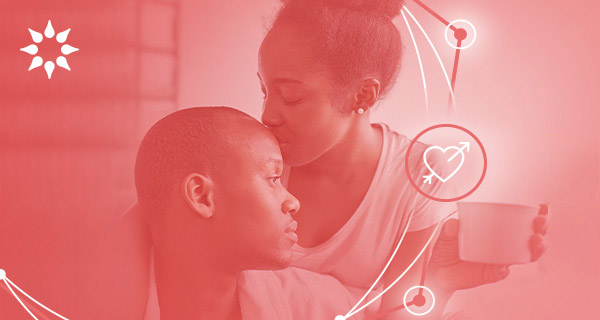Examining Relationships
A relationship is a connection between
two beings. These can be any type of beings but, for this article, we’re going
to narrow the focus onto human beings. Relationships between humans are famed
for being fairly confusing. Let’s see if we can get to the bottom of some of
that uncertainty.
The types of relationships humans may find themselves in over the course of a lifetime are infinite. Any time two or more lives touch, a relationship forms. This includes co-workers, family members, neighbors, the brief period of time during check-out at the grocery store, even shopper and cashier have a relationship! We come into some form of connection with other humans often (even if that link is only virtual). For the purposes of this article, we’ll be focusing on close relationships (sorry, grocery store cashier).
Relational
Styles
Before we get into types of relationships,
let’s talk about styles of relating. These styles, or a mixture of them, can be
present in a variety of different relationships.
- Independent – Independence is a praised personality trait, particularly in the US. This culture highly values being able to act on one’s own without relying on anyone else, but the reality is humans are social creatures. We are a somewhat fragile species that have to rely on cooperation and mutual support to survive, though we certainly do our best to obscure this fact. Beyond our need for survival, we also have a need for connection and belonging. Though some of us may do our best to overwrite this need, as we age. Independent relational styles may feel colder, less bonded, less supportive, and/or maybe less intimately connected because of the prioritization of meeting one’s own needs without relying on other parties. The benefits of independent relational styles can be that each party has room to form and maintain a strong sense of who they are, as an individual. Additionally, independent relationships are unlikely to suffer from a sense of clinginess or lack of emotional space.
- Co-dependent – Co-dependence is the counter to independence. It is a reliance on the other party or parties to the point that being apart is detrimental. This kind of link can form in response to trauma, isolation, or just out of habit. Co-dependent relational styles are often joked about, sometimes endearingly and other times derogatorily. Co-dependency can feel wonderful at times when the connection is strong and deep, and at other times it can feel intensely uncomfortable, like a lack of balance and ability to be one’s own person.
- Toxic – Toxicity is more of a catch-all for multiple relational styles that fall into this pattern. But the result of each of them is somewhat similar: a dysfunctional relationship in which one or more parties feel unheard, disconnected, unimportant, or worse. Toxic relational styles tend to lack open and honest communication, compromise, curiosity, and/or generative problem-solving techniques. If left unaddressed, toxic relationships are likely to stagnate rather than grow.
- Interdependent – Interdependence is an intermediary between independent and co-dependent styles. Interdependent relationships seek to strike a balance between each party being their own person and mutual reliance upon the relationship for support, happiness, and growth. Interdependent relationships value sharing, depth, and bonding as well as personal space, individual goals, and time apart. A difficulty of interdependent relationships is that they have to navigate some of the hurdles of both independent and co-dependent relationships. Interdependence is a goal that takes constant work and processing to maintain.
Types of
Relationships
Now that we’ve covered styles of
relationships, let’s talk about some types of close relationships.
- Friendship – Friendships come in all sorts of shapes. The typical markers of friendship are enjoying spending time together, sharing interests, and ease of connection. There may not be romantic or sexual feelings and there may not be a formal commitment between the parties.
- Familial – Like friendships, families also come in a variety of forms. Sometimes family is coincidental, sometimes family chooses us, and sometimes we choose family. Familial relationships can be characterized by a deep bond that may be regarded as unbreakable. These relationships can be wonderful, and they can also be traumatic, because of the cultural expectations and significance placed upon them. It’s important to remember that family can be chosen, and coincidental “family” may not actually feel familial.
- Romantic – Romance is a tough thing to pin down, but generally it might be said to refer to an attraction between the parties, a loving desire to be intimately connected with each other. Romantic relationships may or may not also be sexual.
- Sexual – Sexual relationships may be romantic, but they don’t have to be. The one true hallmark of a sexual relationship is that the parties consensually participate in sex or sexual activities with each other.
- Monogamous – Monogamous relationships are typically closed one-to-one relationships. Meaning, each member of the relationship is only in that type of relationship with the other. Monogamous relationships are often romantic and/or sexual, however, we have placed a high cultural value on monogamy and therefore monogamous tendencies blossom in a plethora of relationships (like the idea that we can only have one best friend or that we can only engage in a certain activity with a specific person, etc.).
- Non-monogamous – Non-monogamous relationships are structured such that the parties involved understand that each of them may have relationships of that same type, with other people. Relationships that get formally labeled “non-monogamous” are typically romantic and/or sexual. However, informally, having a plethora of close friendships might also be viewed as non-monogamy. “Non-monogamous” functions as both a relationship label and as an umbrella term for other relationship labels, including polyamorous, open, relationship anarchist, etc. Non-monogamous relationships need to be understood as non-monogamous by all parties involved. Infidelity or “cheating” is not non-monogamy, it is a breaking of the agreements of a monogamous relationship.
- Situationship – A situationship is a relationship that is supported mostly by coincidental proximity, or the situation, the parties find themselves in. For example, perhaps the parties are roommates, neighbors, or co-workers who carpool to work, and a connection forms between them; be it friendship, romantic, sexual, or otherwise, due mostly to their proximity to each other. But if the context changes, i.e., if someone moves or gets a different job, these types of relationships tend to fall apart fairly quickly.
There’s No
Relationship Box
These relational styles and types overlap
and modify one another. One can be in a toxic, monogamous friendship; an
independent, non-monogamous, sexual romance; or an interdependent familial
relationship. A few of the styles and types contradict each other, but there
are many combinations that can be made here.
Part of what can be so mysterious or
confusing about relationships is that the boundaries between the various types
of relationships are fairly porous and shifting from one sort of relationship
to another can happen surprisingly quickly. Layer human emotion on top of that
fluidity, and things can get tricky even faster.
It’s important to know about the vast array of relational options available. The mainstream discourse about relationships may have us believe that the only options are friendships, monogamous romantic relationships, familial relationships, and (maybe) sexual relationships. And this can feel limiting because those four relationship templates will not satisfy everyone’s wants and needs. While this article covered more options outside of the mainstream discourse, it would be difficult, if not impossible, to list them all. So here is the assurance that if it can be dreamt, it can be done (as long as all parties consent)!
Being in love is a life experience that everyone deserves. Whether you’re looking for your soulmate or wondering how to keep the romantic fires burning in your relationship, a love psychic can help. They want to see you happy and a psychic love reading is all you need to find or keep the love that is meant for you.
Find a love psychic or learn more about psychic love readings.
About California Psychics
California Psychics is the most trusted source of psychic readings. We have delivered over 11 million discreet and confidential psychic readings by phone since 1995. More than a prediction, we are your guide for life’s journey. Learn more about how psychic readings work and explore the California Psychics blog. With over 500 psychics online to choose from with real customer reviews, you’re sure to find the best psychics for you. Call one of our trusted and accurate psychics today! Confidential and secure, real psychics, accurate predictions, 100% guaranteed.





One thought on “Examining Types of Relationships and Relational Styles”
I’m not looking for lobe. My husband just pasted away Jan -28 – 2022. Just a week ago. I’m just lost in pain, I’m really hurting mentally, emotionally, & in real pain. I’m having money problems, & it just feels like every thing is falling apart. We got married on deb -18 -1994 & we was separated, but was good friends, I spent new years eve with him, & we was talking about getting back together, I Wasn’t dating anyone & he wasn’t ether, we have always been close friends. I’m just lost & don’t know what to do??? Please tell me what or how to get thru this. I’m having a very hard time. Thank you